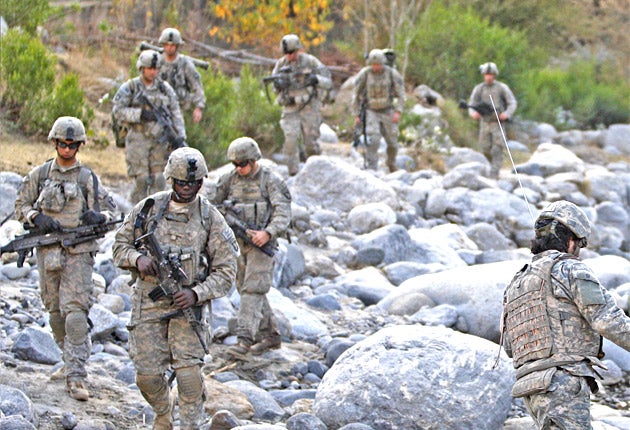US military pushes Obama to allow more Pakistan raids

In a move that would stir intense Pakistani anger, US military chiefs in Afghanistan are pushing the Obama administration to expand cross-border commando raids against Taliban and al-Qa'ida militants hiding in Pakistan's remote tribal areas.
The plan, if implemented, would be a significant escalation in the nine-year war, and a bold gamble to create conditions that would allow US combat forces to leave Afghanistan by the target date of 2014, with an initial draw-down starting next summer.
But it also would place a heavy new strain on Washington's delicate and sometimes fraught relations with Pakistan. Officially, Islamabad is the vital ally of the US if the conflict is to be brought to a successful end – but it also has longstanding unofficial ties with the Taliban, and is deeply resentful of anything that suggests it is not master of its territory.
Word of the proposals, first reported in The New York Times yesterday, comes less than a week after the White House released its latest policy review for Afghanistan. The report declared that Pakistan was "central" to US success in Afghanistan but noted that ties between Washington and Islamabad remained "uneven". Unpublished US intelligence reports are said to strike a still gloomier note. They warned that the war could not be won unless Pakistan stopped the insurgents from launching attacks against allied and Afghan government forces from their sanctuaries in the tribal areas.
The plan to step up special operations raids by US and Afghan units into these areas – above all North Waziristan, base of the al-Qa'ida affiliated Haqqani network – would signify the US had concluded that Pakistan was either unable or unwilling to do it and was taking matters into its own hands. But, experts here say, that could be a very high risk strategy – especially if it is publicly acknowledged.
The Pakistan government is weak at the best of times, not least because of its public alignment with the US, highly unpopular among the ordinary population. It would be weakened further if the US were seen to be treating supposedly sovereign Pakistan territory as its own.
In a sign of the issue's sensitivity, Islamabad recently shut a key border crossing into Afghanistan for 10 days, in retaliation against a Nato helicopter foray in which two Pakistai soldiers were killed. The closure stranded Nato supply convoys and almost 150 trucks were destroyed in raids by militants.
In fact the Obama administration has sharply increased the number of unmanned cross-border drone attacks against suspected Taliban targets in the tribal areas. But it refuses to give any details for fear of offending the Pakistan government whose support it so badly needs.
Yesterday, perhaps for the same reason, officials in both Washington and Kabul flatly denied the plan outlined in The New York Times. There was "absolutely no truth" to reports that US forces are planning to conduct ground operations into Pakistan, said Rear Admiral Gregory Smith, a top Nato spokesman. A Pentagon official also said the alleged proposals were not true.
At the same time Husain Haqqani, Pakistan's ambassador in Washington, said his country's security forces were perfectly capable of handling the militant threat inside its borders. The "material support" of allies, especially the US, was appreciated, he said, but "we will not accept foreign troops on our soil – a position that is well known."
Ostensibly, that remains the view of the US as well. Last week, Admiral Mike Mullen, chairman of the joint chiefs of staff, said the Pakistani military could close down the Taliban sanctuaries, and that he was "encouraged" by actions it had already taken against the militants.
Unofficially though, the approaching deadlines appear to be hardening US determination to extract itself from an unpopular war that is costing an annual $113bn (£73bn) that the country can ill afford. "Come hell or highwater, American troops will be out of Afghanistan by 2014," Vice President Joe Biden said at the weekend.
Washington still seeks an accommodation with at least moderate elements of the Taliban. On cable TV, Zbigniew Brzezinski, National Security Advisor to President Carter, said some such deal was essential if the US was to disengage as it hoped. "We have to face the fact that Pakistan has a vital interest in a pro-Pakistan Afghanistan." Unless Washington accepted that reality, a solution would be impossible, he said.
Join our commenting forum
Join thought-provoking conversations, follow other Independent readers and see their replies
Comments